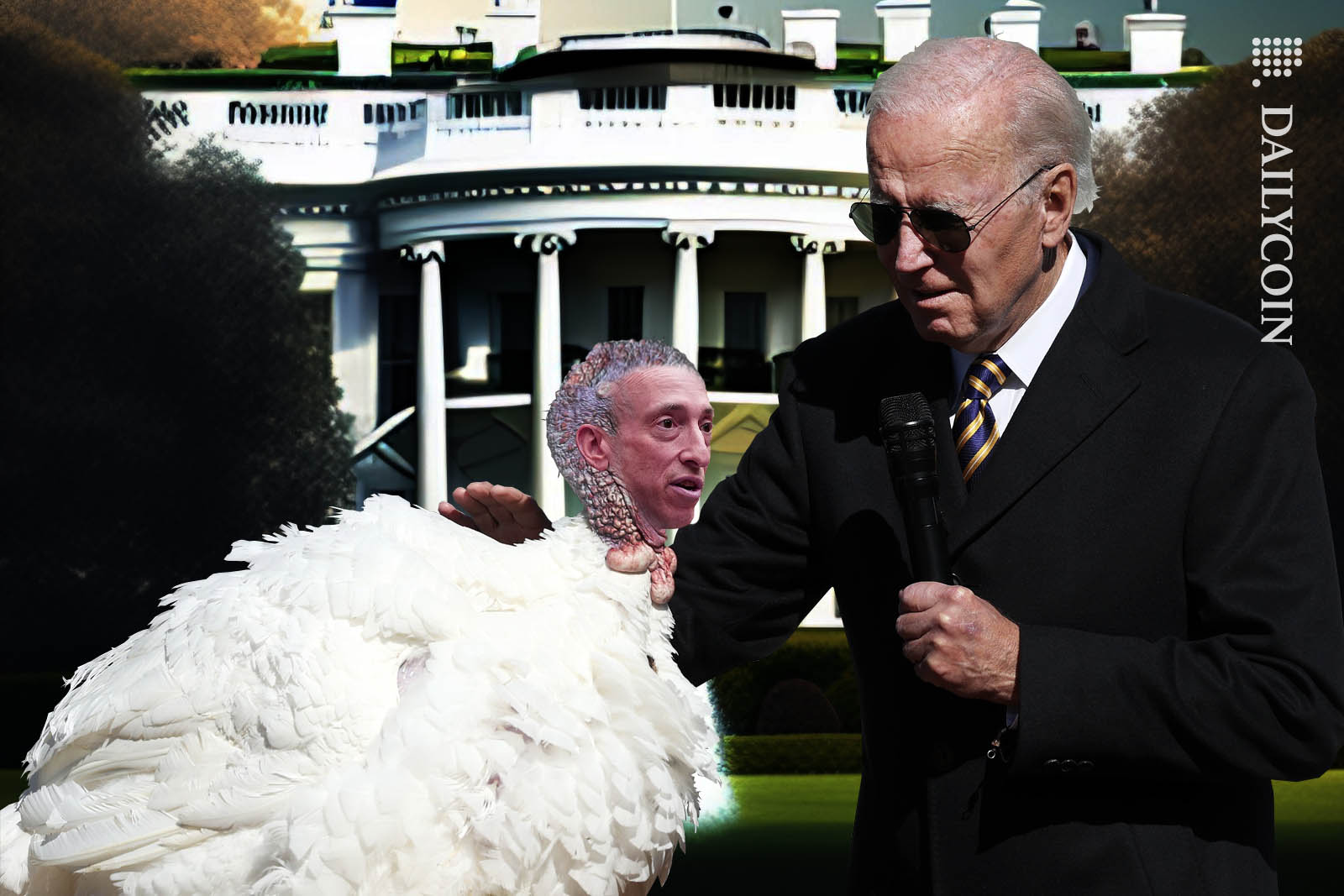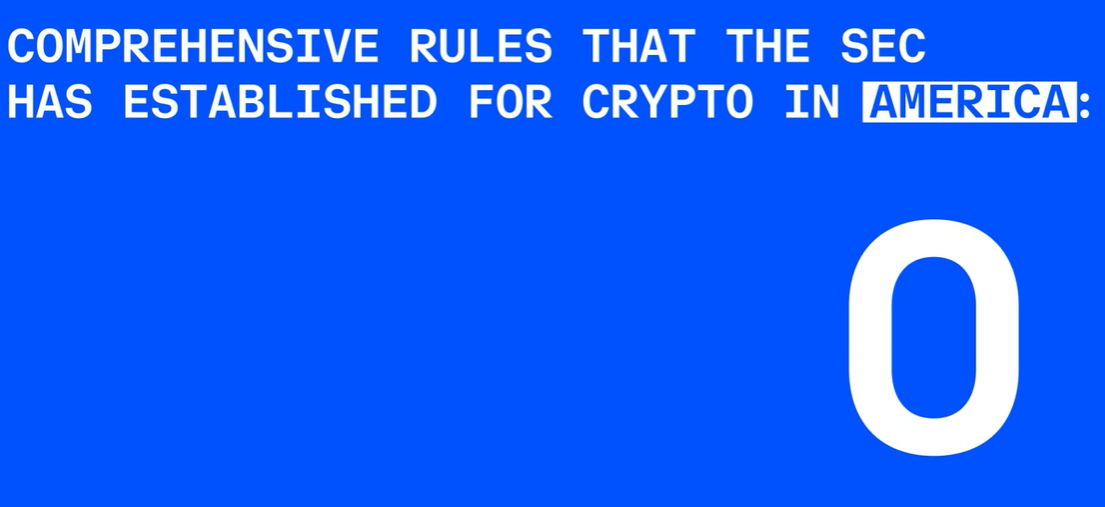
Every Thanksgiving, the United States of America consumes around 46 million turkeys in the space of just one day. However, every year, two lucky birds get the rare opportunity to brush shoulders with the President and avoid being stuffed and roasted for another year.
The Presidential Pardon has become another key tradition in the American calendar, adding a layer of forgiveness (or mercy, depending on your point of view) to the National Holiday.
With the spirit of Thanksgiving in mind, let’s turn our attention back to blockchain and cryptocurrency.
Sponsored
Which crypto market turkeys have ruffled the industry’s feathers this year, and do they deserve to be pardoned by the crypto community?
Table of Contents
What Is a Presidential Pardon?
Tracing its roots back to the mid-20th century, the Presidential Turkey Pardon is a symbolic gesture where the U.S. President “pardons” a live turkey, sparing it from becoming a festive meal.
While some attribute the beginning of this tradition to President Harry S. Truman, this isn’t the case. While Truman was offered a live bird from the National Turkey Federation, it is widely believed that this turkey found its way to the Presidential Dining Table at Christmas later that year.
Sponsored
Over the years, the ceremony has evolved and become as much a part of Thanksgiving as cranberry sauce and pumpkin pie. In 1989, George Bush formalized the Presidential Pardon, turning the event into an annual tradition.

Since then, various Presidents have added their own flair and humor to the ceremony, usually providing a litany of groan-inducing puns. The Turkey Pardon serves as a poignant reminder of key Thanksgiving values, namely the power of mercy, compassion, and gratitude.
Forgiving the U.S. SEC this Thanksgiving
The crypto space has been through a wild year. While sentiment is largely positive, regulators like the United States Securities and Exchanges Commission (SEC) have done everything possible to inhibit the blockchain industry.
But the SEC isn’t a force of evil trying to destroy the crypto space. Despite how crypto media makes it sound sometimes, the SEC’s primary goal is simply to protect investors and provide regulatory clarity around securities.
Given the disastrous events of the past two years, like the LUNA collapse and the FTX scandal, it’s clear that the SEC has failed their mission. But instead of crucifying them on social media, perhaps there’s a better way forward.
Perhaps it’s time to appreciate the challenges of regulating a rapidly evolving industry and collaborate with the SEC, making positive changes in everyone’s best interests.
Before exploring how things could be achieved, let’s recap what the SEC has done wrong this year.
What Has the SEC Done Wrong?
Where do we begin? Led by Chairman Gary Gensler, the SEC has waged a regulatory war on the crypto space for years.
The most obvious example was the long-winded legal battle between the SEC and Ripple Labs, creators of the XRP cryptocurrency. The courtroom drama began in December 2020 when the SEC charged Ripple Labs with the unauthorized sale of unregistered securities, namely XRP coins.
The saga dragged on for years before finally being resolved in 2023. To make a long story short, Judge Torres eventually declared that the XRP cryptocurrency could not be considered a Security. Several months after this pivotal declaration, Gensler and the SEC finally dropped the charges.
Crypto won in the end, but Gensler and the SEC committed significant time and resources to the case that arguably would been better spent investigating Sam Bankman-Fried’s fraudulent FTX exchange.

Beyond the XRP case, the SEC has also filed lawsuits against crypto exchanges like Coinbase and Binance. According to Coinbase founder Brian Armstrong, the SEC has been incredibly inconsistent and sometimes downright ‘sketchy’ in their approach to cryptocurrency regulations.
Why Should We Pardon the SEC?
With all this in mind, pardoning the SEC seems like a tall order. Gary Gensler and his attack dogs haven’t missed a beat over the last two years, handing out lawsuits and fines left, right, and center. Why do they deserve our forgiveness?
The SEC aims to protect investors, maintain fair, orderly, efficient markets, and facilitate capital formation. Pardoning the SEC and committing to a mutually beneficial relationship can only help the crypto space move forward with clarity. This will help emerging blockchain companies operate confidently without being bound by complicated restrictions.
We’re already seeing this take effect. Compared to their treatment of XRP and crypto exchanges, the SEC has been relatively open to Spot Bitcoin ETFs. Several high-profile financial firms like BlackRock and Valkyrie have filed for Spot BTC ETFs, which will help to bring a massive influx of capital and liquidity to Bitcoin markets.
As much as we might despise Gary Gensler and the SEC, it’s essential to see the bigger picture. A positive, collaborative relationship between the crypto space and the SEC is the key to a clear path forward for the entire industry.
But what does this path look like?
What Do We Want from the SEC?
Part of moving forward together means the crypto community needs to clarify what they expect from the SEC and how they can help this burgeoning industry reach its potential. What does the crypto world truly desire from the SEC?
- Clearer Guidelines – The crypto landscape is vast and varied, and one-size-fits-all regulations can stifle innovation. Crypto businesses seek more precise and comprehensive guidelines that cater to the unique nature of different digital assets and blockchain projects.
- Open Collaboration – The SEC needs to be more understanding of crypto’s specific needs. Engaging industry experts, developers, and stakeholders in the regulatory process can lead to more informed and effective regulations.
- Educational Initiatives – The general public widely misunderstands cryptocurrency. Partnering with industry leaders, the SEC should launch educational initiatives to help the masses understand the nuances of cryptocurrencies instead of cautioning people against them entirely.
- Support for Innovation – Regulation shouldn’t come at the cost of innovation. The community hopes the SEC recognizes the transformative potential of blockchain and crypto and creates a regulatory environment that supports and nurtures crypto’s potential.
- Swift Decision Making – Crypto moves fast, and lengthy delays from the SEC can hamstring the growth and development of the industry at large.
Making peace with the SEC means that the cryptocurrency industry can move forward. But that doesn’t mean that some things shouldn’t be left behind.
Does Gary Gensler Deserve a Crypto Pardon?
If you recall, Gary Gensler topped our list of 2023’s crypto villains. Gensler’s war on crypto was so relentless you couldn’t be blamed for wondering if the SEC Chair harbored some personal vendetta against crypto.
What many people don’t know about Gensler is that the SEC Chair taught a course on blockchain technology and cryptocurrency at MIT’s Sloan School of Business Management. Despite being an apparent expert in the field, Gensler later admitted that he had never even owned any cryptocurrency.
He also once shilled Algorand as a groundbreaking new network that could support platforms like Uber. He seems to have changed his tune since then, declaring that the crypto industry is full of ‘hucksters, scam artists, and fraudsters.’ He’s since turned around and labeled ALGO an unregistered security and sued exchanges for listing it.
As Congressman Tom Emmer put it, the two greatest failures (LUNA and FTX) in crypto history occurred while Gary Gensler held office. He argues that Gensler is an “incompetent cop on the beat, doing nothing to protect everyday Americans.”
A positive working relationship with the SEC is key to progressing blockchain technology’s potential and expanding this thriving industry. As long as Gary Gensler is at the head of the SEC, his tireless crusade against digital assets will only inhibit crypto’s growth.

While pardoning the SEC would be a long-term benefit for crypto and regulators, Gensler has displayed incompetence and unwillingness to support the blockchain industry in any way, shape, or form.
This is a turkey that should not be pardoned this Thanksgiving.
On the Flipside
- The SEC’s failure to provide regulatory clarity is less of a problem than people make it out to be. The U.S. is one country in a globe of opportunity. All emerging blockchain businesses need to do is set up their operations in countries with more distinct regulations, like Malta or the UAE.
Why This Matters
Thanksgiving is a good opportunity to not only show gratitude but to show mercy. Like the President’s turkey, let’s pardon the SEC this year and focus on building a better future together.
FAQs
Every year, hundreds of Thanksgiving-inspired meme coins like Pumpkin Inu are launched to celebrate the national holiday. Almost all of them die within a few days.
According to Gensler, the crypto space is plagued with ‘hucksters, scam artists, and fraudsters.’
No, despite teaching a course on blockchain and cryptocurrency at Sloan School of Business, Gary Gensler has since admitted he has never owned any cryptocurrency.
